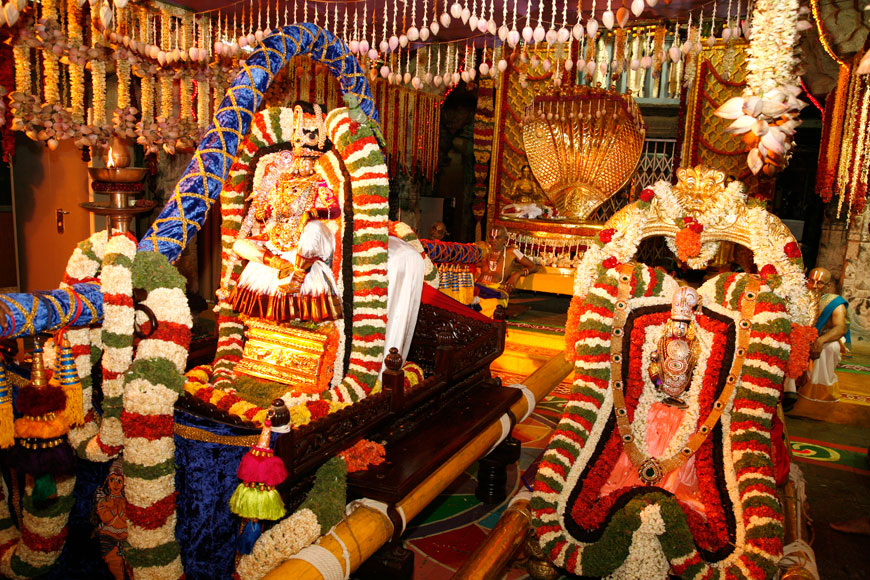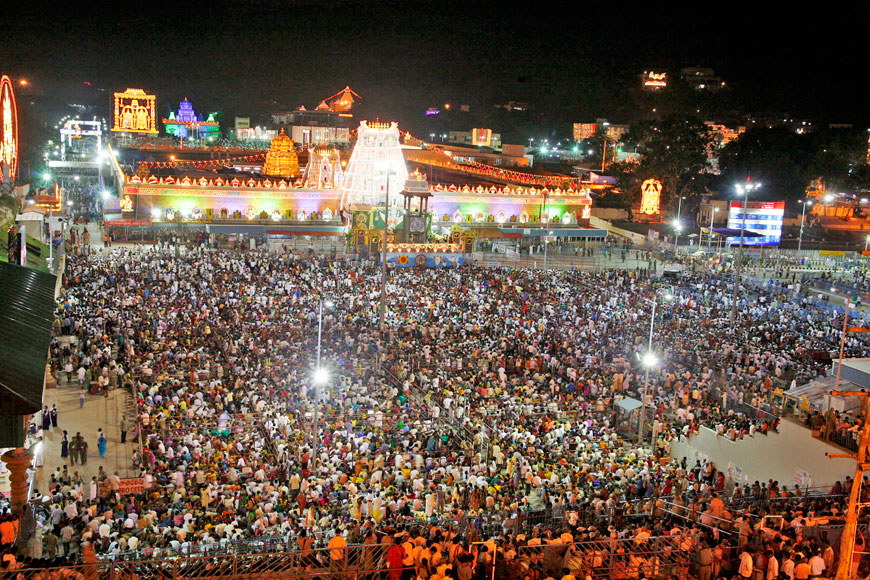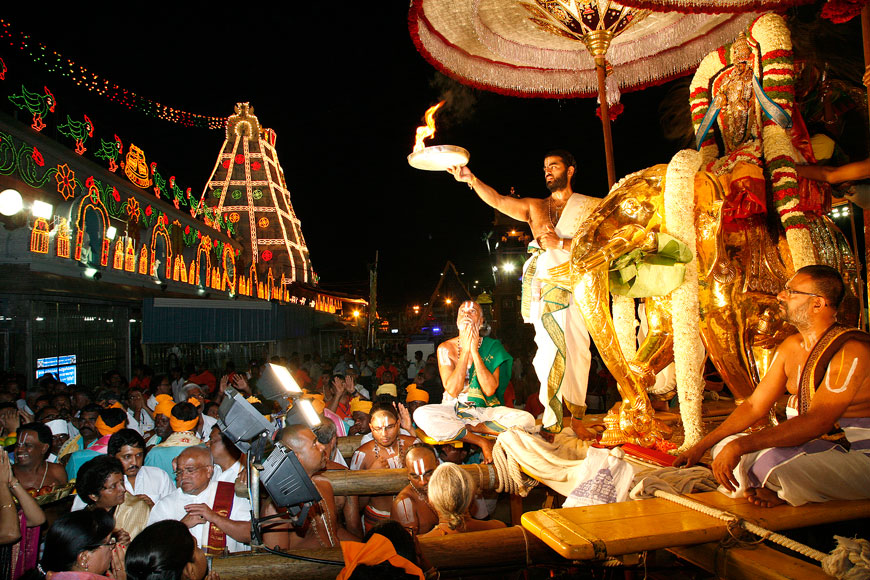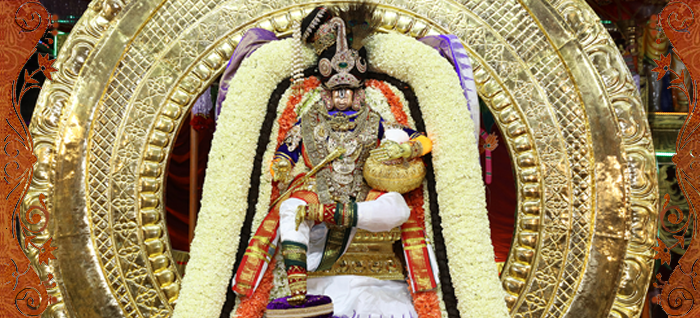
The mismanagement of temple funds and properties has reached alarming levels. At the Sabarimala Sri Ayyappa Temple, 4.54 kg of gold was lost during an unauthorised transit for electroplating work, which could only be described as a brazen act of theft. Devotees believe that the temple management, from the counter clerk to the chairman of the trustees and the head priest, is engaging in various schemes to embezzle crores of rupees. This issue isn’t limited to larger temples; even smaller ones are plagued by rampant pilferage. The deities remain silent witnesses, leaving believers terrified. Investigations into these matters seem pointless, akin to assigning a thief to investigate their own crime.
Two years ago, R V Ravi Kumar, an employee of Tirumala Tirupati Devasthanams (TTD), was caught stealing money red-handed on CCTV. The case was settled in a Lok Adalat after the culprit surrendered properties worth ₹40 crore to the TTD, and the board hurriedly sealed the scandal. After the change of government, allegations resurfaced as CCTV footage presented more evidence. The size of the embezzlement was much larger than ₹100 crore, which was invested in real estate. That may be only the tip of the iceberg. Questioning the settlement, the High Court ordered a CID probe. The investigation is now on. The Sabarimala embezzlement may surpass the ₹100 crore loot of Tirupati that has evolved over a long period; a comprehensive investigation may reveal further details.
Sabarimala has been surrounded by controversy for the past decade. The immoral interference and the temple control by the political class have been desecrating the holy place where 55 million devotees reach for blessings after a laborious leg way through the wild forest. Atheists masquerading as theists stash away a staggering amount of temple wealth with no remorse, putting even thieves to shame. The removal of gold-clad copper coverings from the “Dwarapalaka Idols” located on either side of the sanctum sanctorum, without prior notification to the Special Commissioner, has now shocked the state. Justice Raja Vijayaraghavan and Justice K V Ajayakumar of the Kerala High Court ordered to initiate a suo motu proceeding.
Besides the loot, people like Unnikrishnan Potty, the suspected kingpin of the embezzlement, collected an untold amount from devotees while installing gold-plated panels for pooja at various locations over a month. Potty is known to be close to many State and Central politicians, leaving a space for his suspicious relationship with the broader political world and influence in the temple administration. The issue is not a small scam, but a perpetual robbery legitimised by the vulnerability of law granted through the Seventh Schedule of the Constitution. One cannot rule out the possibility that shrewd individuals may attempt to use temples as a money laundering platform through men like Potty and several others in his group.

The central government has introduced a strong anti-money laundering mechanism; however, embezzlement from temples does not seem to fall under the money laundering category. The mafia is on the lookout for unsuspecting ways after some failed gold smuggling under tight customs supervision. Exchange through the temple can evade all culpabilities.
Incidentally, states have framed their rules under the Hindu Religious and Charitable Endowments to protect the wealth of temples. But the rules have produced foxes to guard the henhouses! That is the typical case of Sabarimala, the forest temple famous for pilgrim tourism. Like most temples, the exact income of Sabarimala is not yet clear, or at least not the real figures it periodically reports. The leakage is an alarming 40 per cent, and spending on record is inflated by another 40 per cent. The core of the art of embezzlement lies within the state political appointments from time to time, as the state government changes.
Unnikrishnan Potty has been powerful enough to alter the official records and change gold into silver in the book entry. He might be so influential that he could convince temple officials to hand over valuable items to certain commoners on record, with the current officials’ approval, even if those officials were not actually present. On August 11, 2016, Potty sent an email.
” Respected Sir,
I am Unnikrishnan Potty, residing in Bangalore. I would like to inform you that I have some gold balance in my hand after finishing the gold work of the Sabarimala sanctum sanctorum main door and the dwarapalakar’s. I would like to use it for a girl’s marriage who needs support and genuine, in coordination with the Travancore Devaswom Board. Please give your valuable opinion in this regard.”
The High Court was thunderstruck by this scandalous email.
Indian states have varying regulations for managing temples, and within these states, different models of administration are employed. However, those models with significant state government involvement often find themselves at the centre of scandals and embezzlement cases. The Sri Padmanabhaswamy Temple in Thiruvananthapuram is the richest in the world, with 7,800 kg of gold that the deity owns.

The temple does not fall under any Devaswom board, as the royal family manages it following the Supreme Court’s ruling. The temple has an administrative committee that includes a member from the Central Government. In contrast, Sabarimala, also located in Kerala, is administered by a Devaswom board, which has been associated with numerous scandals. This comparison highlights the differences in governance and the issues that can arise depending on the management model used.
States like Kerala and Tamil Nadu face numerous allegations of embezzlement, worse than unpunished theft. Most of these allegations go unchecked despite considerable evidence, often due to political appointments. Temples sadly serve as open grounds for licensed theft, ignored by the government even when it causes public scandal. It is a form of money laundering—donations are hidden away without fear of being caught. Temples are public properties, and states act as surrogate custodians. Yet, they fall outside the scope of the Enforcement Directorate, even though temples are used for money laundering—funds flow from unknown sources and are diverted by the management.
States can have rulers who may not need to be believers in any religion, or may be believers in a particular religion and self-proclaimed secularists. While the constitution does not prohibit a believer or non-believer from holding law-making positions, the contradiction of a non-believer ruling temples by entering the temple trust as government-appointed administrators and trustees remains problematic. This undermines the Right to Freedom of Religion under Article 25 of the Constitution, which grants every person the right to freely profess, practice, and propagate their religion. First of all, no rule forbids a non-believer from being a temple administrator or a trustee. Here, a change is necessary. The fundamental right to religious denomination is a religious subject, but temple administration is a secular subject.
Article 25(2)(a) allows the state to pass laws “regulating or restricting any economic, financial, political or other secular activity which may be associated with religious practice”. This is the primary constitutional basis for states to enact laws, such as the Hindu Religious and Charitable Endowments (HRCE) Acts, to govern temples. It gives religious groups the right to manage the property they own or acquire, according to the law. On the contrary, the religious institutions like the Dewasom board are run by politicians under political orders. The Supreme Court has, at different times, affirmed the power of states to regulate temples and clarified the distinction between secular and religious matters. That means temples are both religious and secular institutions dealing with the state subject of HRCE and the central government subject of wealth and properties. Temple wealth and properties are not agricultural subjects, which sets temples free from state subject in this aspect.
The State list and concurrent list under the Seventh Schedule empower the state governments to make laws concerning “charities and charitable institutions, charitable and religious endowments, and religious institutions.” Let us not forget that the concurrent list also allows the Central government to make laws. In case of conflict, parliamentary action will prevail unless the state law has not received the presidential assent. That means the central government has a space to deal with temple issues, especially regarding wealth and property accountability. Article 26(d) is essential to protect the interest of religious denominations’ right to administer their property, according to the law. Can the law that binds the wealth and property be a state subject?
Although the Supreme Court, while considering various cases at different times, affirmed the power of states to regulate the management of temples’ wealth and property, it also distinguished between religious and secular activities within the overall functions of temples. It clarified the difference between religious denominations’ fundamental rights to religious activities and their administrative functions as secular aspects. That is fine.
Although the Supreme Court, while considering various cases at different times, affirmed the power of states to regulate the management of temples’ wealth and property, it also distinguished between religious and secular activities within the overall functions of temples. It clarified the difference between religious denominations’ fundamental rights to religious activities and their administrative functions as secular aspects. That is fine.us consider the issue of wealth and property. The wealth and property of the temple are not related to agricultural land or state revenue. Therefore, the central government has authority over the wealth and property of both institutions and individuals. The division of tax revenue between the state and the central government under different models is a separate matter.
Temples are essentially public properties owned by the deities, who are juristic persons. The owners of the temple properties are not the state governments, nor administrators, nor any individual. Worshippers are the next friend of a deity, not any manager, administrator, or collector as a revenue authority. We observed that the Comptroller and Auditor General (CAG) had to withdraw its audit team from the Tamil Nadu Hindu Religious and Charitable Endowments (HR&CE) department because the department refused to provide the necessary documents. The non-cooperation occurred during a compliance audit planned for May 2022. The Parliament can introduce new laws or amend existing ones to enforce rights guaranteed under Article 35, ensuring national uniformity.
The government should amend the CAG (Duties, Powers and Conditions of Service) Act, 1971, to widen its duties, powers and conditions of service so that it can look into the financial matters of public institutions funded solely by the public, which are equal to voluntarily tax-paying, especially in the context that the temples are exempted from all types of taxes. The government should put in place a regulatory authority.
Temple administration, being a secular activity, commonly witnesses irregular exercise of authority, scandals and embezzlements, mostly in temples based in the south administered by public Boards. Two large temples of the south, Tirupati Thirumalai Devasthanam and Sabarimala, witnessed a billion-rupee theft and daylight robbery of gold, regularly cheating even the deities. The gold turning copper is a small scam compared to the size of the amount involved in embezzlement through inflated purchases of pooja materials, underreporting of hundi collections, and underbilling of offerings. There are instances of extensive land encroachment, both failed and successful evictions of illegal occupations, and the loss of land records, along with systematic stealing and lifting.
Since this is an exploitation of belief and the deities’ silence, these are not state issues and should not come under the seventh schedule of the Constitution. The Central government has sufficient grounds to address the subject of temple management under the provisions of the Seventh Schedule of the Constitution itself. Being in the Seventh Schedule, third list under Article 245, the Centre also has the right to interfere in the matter. Similarly, the Central government can expand the rights of the Comptroller and Auditor General through an appropriate amendment, since temples are voluntarily public-funded, comparable to mandatorily tax-funded public spending. In the case of the concurrent list under the Seventh Schedule, the central government has an upper hand and constitutional edge over the states.
Every temple with a wealth above ₹1 crore should be brought under CAG audit. Or, it is high time for the government to put in place a regulator with strict compliance requirements and accountability of administrators. Moreover, with more than half the states under the ruling party of the centre, and a combined majority in the House approaching two-thirds, an essential and feasible amendment to reform the temple administration can become a reality if there is the will.

